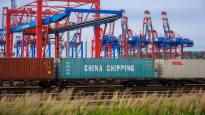China is an even more challenging place for Finnish companies. The Finnish chambers of commerce operating in China surveyed the confidence of Finnish companies operating in China in China as a market area.
The Finnish Chambers of Commerce in China surveyed the confidence of Finnish companies and corporations in the business climate. The survey found that just over a third of respondents expect difficulties to increase this year. Another good third expects the business climate to remain the same and a quarter expect it to improve.
More than half of the companies have been operating in China for more than ten years. 125 Finnish companies operating in China responded to the survey in January-February.
– The mood is probably even more negative today, because the war in Ukraine began only after the poll. It will inevitably have an impact here as well, says Stora Enso’s head of the board business in China Pentti Ilmasti.
At the moment, however, the biggest concern is the corona pandemic.
The air gives an interview via video from a remote home in Shanghai, where the number of coronavirus infections in the day had just reached record highs of nearly a thousand. In many neighborhoods, people are not allowed to leave their homes.
The Omikron wave is currently spreading in China and destabilizing the economy. Infection rates have risen to peak levels in the early days of the pandemic. China’s tight zero tolerance has closed its external borders, stalled air traffic, and quarantined entire cities for two years now, even though infection rates are low compared to the rest of the world.
Stora Enso has had to constantly search for new transport routes with agility.
There is sufficient demand for Stora Enso’s cartons, but they are difficult to obtain for customers. Last week, the closure of the big city of Shenzhen caused the company a headache.
– If drivers are required to have a coronavirus test taken within 48 hours, it may surprisingly be that there is no desire to move from one province to another, Ilmasti describes.
Costs even tripled
Stora Enso imports pulp into China and manufactures packaging board products. Transportation costs are rising. In China, fuel prices have risen rapidly.
– Some costs have even tripled. The problem in transporting finished products outside China is not only the increase in costs, but also the lack of enough containers and routes, Ilmasti says.
Companies are ready to invest
Executive Director of the Beijing Chamber of Commerce in Finland Ulla Nurmenniemi says that the business climate survey of Finnish companies shows optimism and confidence in the Chinese market.
– It is clear from the study. Despite the challenges, companies are ready to invest. That has been said a lot in this situation, Nurmenniemi ponders.
69 percent of companies that responded to the survey expect their earnings to grow this year. One-fifth of companies forecast a decline in their results.
– The whole world is more challenging than before. If somewhere the challenges are less, it’s China. It is based on a huge internal market, Nurmenniemi says.
China is also a lucrative market for Stora Enso. Air is reminded that the problems in Europe are even greater with rising energy and raw material prices, among other things.
Attractiveness has decreased
The Chamber of Commerce’s survey also reveals challenges that have also been identified in the European Chamber of Commerce’s reports. At present, companies compete fiercely with local players.
There is an oversupply of goods and local companies often cope more easily with the permit bureaucracy than foreign companies. The rise of nationalism has also meant favoring local businesses.
Stora Enso has been in China for 35 years.
– I would say that China has lost its attractiveness. Profitability is not as high as it could be. Cost factors are a big deal, Ilmasti says.
In addition to the corona pandemic, companies in China have also been hit by world politics.
According to Nurmenniemi, Executive Director of the Finnish Chamber of Commerce in Finland, the trade war between the United States and China no longer worries Finns as much as before. 17 percent of respondents felt they had benefited from the departure of U.S. companies.
– A new concern is the deterioration of trade relations between Europe and China. Escalation could weaken future prospects, Nurmenniemi says.
The planned ratification of the investment agreement by the EU and China is still pending after the EU and China imposed sanctions on each other. They stemmed from a dispute over human rights abuses against the Uighur minority in China.
Nationalist shoemakers in China boycotted Western clothing chains. For some time, consumers missed H & M’s and Adidas’ products, among others.
Viscose from the Uighur regions was questioned
Stora Enso has also been subjected to a political crossfire. Last year, it was also reported in Finland that Stora Enso supplied soluble pulp for the production of viscose to the western Chinese province of Xinjiang.
The factories of the state-owned Zhongtai Chemical Company are said to be located next to Uighur detention centers. Human rights organizations have been concerned about forced labor in factories in Xinjiang.
Stora Enso announced that it would cease production and exports of soluble pulp to Xinjiang. According to the aerator, the company acted in accordance with its strategy and locally has not heard of Stora Enso doing anything wrong in China.
– Stora Enso was active in the closure of all operations in Russia and Belarus due to the war in Ukraine. We were the first forest company to make a big decision, Ilmasti says.
Birch wood imported from Russia must now be replaced in Finland, for example, from domestic forests or eucalyptus pulp imported from South America.
For the climate, times in China are not unique. He was already working there 25 years ago when the SARS epidemic struck China. Now, however, there is a global pandemic.
– It already seemed that it would be resolved and then came the war started by Russia.
